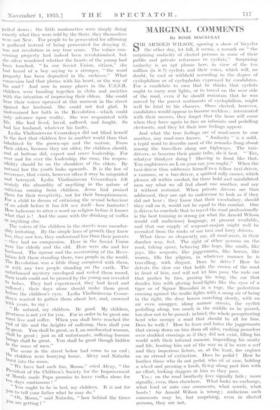MARGINAL COMMENTS
By ROSE MACAULAY SIR ARNOLD WILSON, opening a show of bicycles the other day, let fall, it seems, a remark on " the surprising audacity of elected persons in some of their public and private references to cyclists." Surprising audacity is an apt phrase here, • in view of the ten million (is it ?) cyclists and their votes, which will, no doubt, be cast or withheld according to the degree of cyclophilism or of cyclophobia expressed by candidates. For a candidate to own that he thinks that cyclists ought to carry rear lights, or to travel on the near side of the road, even if he should maintain that he was moved by the purest sentiments of cyclophilism, might well be fatal to his chances. Once elected, however, candidates would appear to become reckless ; intoxicated with their success, they forget that the hour will come when they 'have again to face an infuriate and pedalling electorate, and they let their true feelings appear.
And what the true feelings are of road-users to one another, any road-user knows. " Audacity " is a mild, a tepid word to describe most of the remarks flung about among the travellers along our .highways. The taxi- drivers, as beseems their pirate tribe, do it best. " 'Ere, whatyer thinkyer doing ? Shoving in front like that. You oughterave an L on your car, you ought." When the taxi-driver thus addresses himself to a fellow taxi-driver, a vanman, or a bus-driver, a spirited rally ensues, which pleases all within earshot, for these bold and uninhibited men say what we all feel about one another, and say it without restraint. When private drivers are thus addressed, they are apt to endeavour to look as if they did not hear ; they know that their vocabulary, should they call on it, would not be equal to this combat. Orie is driven to conclude that to travel the road professionally is the best training in strong (or what Sir Arnold Wilson would call audacious) language, at present available, and that our supply of sergeant-majors might well be recruited from the ranks of our taxi and lorry drivers.
What these so eloquently say, all road-userS, in their dumber way, feel. The sight of Other persons on the road, taking space, behaving like hogs, like snails, like jays, like serpents, like juggernauts, like horses, like worms, fills the pilgrim, in whatever manner he is travelling; with disgust. Does he drive ? How he detests the slow car that holds the crown of the road in front of him, and will not let him pass, the rude car that pushes by him, grazing his wing, the ear that dazzles him with glaring head-lights like the eyes of ' a tiger or of 'Signor Mussolini in a rage, the pedestrian crossing against the traffic lights with a smug air of being in the right, the dray horses marching slowly, with an air even smugger, along narrow streets, the cyclist pedalling along, too much in the middle to be passed, too slow not to be passed; in brief,. the whole peregrinating herd who occupy a road that should be all for him. Does he walk ? • How he fears and hates the juggernauts that swoop down on him from all sides, rushing pauseless over studded crossings as if they did not exist, filling his world with their infernal rumour, imperilling his sanity and life, hooting him out of the way as if he were a serf and they imperious lictors, or, at the least, fire engines on an errand of extinction. Does he pedal ? How he loathes those who do not pedal, who sit at ease, holding a wheel and pressing a knob, flying along past .him with no effort, looking daggers at him as they pass.
Yes ; on the road brotherly love signally fails ; more signally; even, than elsewhere. What looks we exchange, what loud or solo voce comments, what scowls, what hoots ! Sir. Arnold Wilson is wrong ; audacious such comments may be, but surprising, even in elected persons, they are not,


























































 Previous page
Previous page